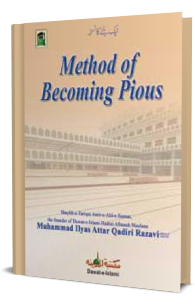
Hadith Gateway
Hasten to Virtuous Acts
Mawlana Muhammad Nasir Jamal Attari Madani
The final Prophet صَلَّى الـلّٰـهُ عَلَيْهِ وَاٰلِهٖ وَسَلَّم said:
بَادِرُوا بِالْاعْمَالِ فِتَنًا كَقِطَعِ اللَّيْلِ الْمُظْلِمِ، يُصْبِحُ الرَّجُلُ مُؤْمِنًا وَيُمْسِي كَافِرًا، اَوْ يُمْسِي مُؤْمِنًا وَيُصْبِحُ كَافِرًا، يَبِيعُ دِينَهٗ بِعَرَضٍ مِنَ الدُّنْيَا
“Hasten to perform virtuous deeds before tribulations, like pieces of a dark night, occur, whereby a man will be a believer by day and a disbeliever by evening, or he will be a believer in the evening and a disbeliever by day. He will sell his religion for trivial worldliness.”[1]
The immense love of the Messenger of Allah صَلَّى الـلّٰـهُ عَلَيْهِ وَاٰلِهٖ وَسَلَّم for his nation is evident from these words. The hadith commentators have gone to great lengths in unlocking the nuances of this hadith, the summary of which is as follows.
The meaning and benefits of hastening to perform virtuous acts
Hastening in attaining something before it finishes or removing something before it brings harm is known as mubādarah (مبادرة) in Arabic.[2]
In the Quran, rushing to carry out righteous acts is listed as a quality of the noble Prophets عَـلَـيْهِمُ السَّلَام and a secret behind their supplications being answered.[3]
Like long, dark nights, tribulations cause anxiety and are unsafe. This hadith commands us to hasten in performing good deeds in times of security and physical strength before the onset of these tribulations.[4]
Moreover, it teaches us that the believer who does not delay carrying out righteous acts will remain steadfast.[5] By extension, this means he keeps being granted the ability to hasten in performing righteous acts. It should be remembered that this ability is a special blessing from Allah.[6]
It is mentioned in another hadith, “Whosoever longs for Paradise hastens to perform pious deeds.”[7]
Comparing tribulations to a dark night
There is deep wisdom behind the Prophet’s eloquent comparison between tribulations and a dark night:
1. Just as a dark night makes people disturbed and restless, these tribulations will also agitate people and cause anxiety.[8]
2. These tribulations will be terrifying like a dark night. Most people will not know from where they came or how to save themselves. Tribulations are of many kinds, such as plundering, killing, abundance of acts prohibited by Islamic law, and disputes between Muslims in worldly and religious matters. In the presence of these tribulations, carrying out virtuous acts will become ever increasingly difficult.[9]
Two tribulations
The Messenger of Allah صَلَّى الـلّٰـهُ عَلَيْهِ وَاٰلِهٖ وَسَلَّم mentioned two types of tribulations in this hadith:
3. A transformation by which a person begins the morning as a believer and becomes a disbeliever by evening, or is a believer by evening and disbeliever by morning. It is apparent that morning and evening are close to each other.[10] Some people will be so unstable that they will be a Muslim one moment and disbeliever the next.[11]
4. Selling one’s faith for material gain is a tribulation which comes in many forms:
1. There will be plunder and killing between two groups of Muslims merely due to rage and partisanship. They will also deem each other’s blood and wealth permissible for the other.
2. Tyrants and oppressors shall rule. They will spill the blood of the Muslims, usurp their wealth unlawfully, engage in fornication and drink alcohol. Some people will deem them to be upon the truth. In fact, some evil scholars will declare their forbidden acts as permissible.
3. Buying, selling, marrying and other general happenings will be carried out in impermissible fashion that oppose Islamic teachings.[12]
The lives of the pious servants of Allah are replete with knowledge, action and sincerity. They do not allow any opportunity to acquire knowledge to slip from their hands. Engaging in virtuous acts for Allah’s sake is from their foremost priorities. Their quality of extracting important lessons from seemingly normal occurrences is also worthy of emulation.
The saint Ibrāhīm b. Adham رَحْمَةُ الـلّٰـهِ عَلَيْه purchased a slave and asked him, “What will you eat?”
He replied, “Whatever you feed me.”
He inquired, “What is your name?”
He said, “Whatever name you give me.”
“What will you wear?”
“Whatever you will give me to wear.”
“What work will you do?”
“Whatever task you give me.”
“Do you not have your own desire?”
“A slave has no want whilst he has his master.”
Ibrāhīm b. Adham رَحْمَةُ الـلّٰـهِ عَلَيْه said to himself, “Poor slave! Has even one moment of your life passed like this for the sake of Allah?”[13]
Time cannot be retrieved
If only we would also become true servants who submit to the commands of Allah wholeheartedly and rush to please him with virtuous acts. After all, obeying Him is the only security against tribulations. Value your time and save yourself from spending it carelessly.
Reflect a little. If we leave performing pious deeds until tomorrow, remain involved in frivolous or sinful acts today and lose our determination, capability and time, then we should remember that time will not halt for us. We should ensure to value it.
Start salah again today, not tomorrow. If you have missed fasts, owe zakat or must perform Haj, then you should carry out these duties also. If you have any financial obligation to someone, do not postpone its fulfilment without reason. If you have been unjust to someone, you must compensate them as much as possible. In short, seek knowledge of Islam and act upon it with sincerity.
[1] Ṣaḥīḥ Muslim: 313
[2] Sharh Taibi, vol. 10, p. 54
[3] Tafsīr al-Nasfi, Al-Ambiya, under verse no: 90, p. 725
[4] Fi Zlaal al-Hadith al-Nabawi, p. 103
[5] Sunan Abī Dāwūd: 4,270
[6] Mirāt al-Manājīḥ, vol. 5, p. 225
[7] Shu’ab al-Īmān: 10,618
[8] Fi Zlaal al-Hadith al-Nabawi, p. 103
[9] Mirqāt al-Mafātīḥ: 5,383
[10] Mirāt al-Manājīḥ, vol. 7, p. 212
[11] Mirqāt al-Mafātīḥ: 5,383
[12] Sharh Taibi, vol. 10, p. 54, hadith: 5,383
[13] Tahzeeb Al-Asraar Lil-Kharkoshy, p. 193
















Comments